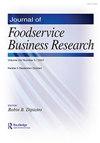Business model shift in independent restaurant operation: the COVID-19 impacts
Q2 Agricultural and Biological Sciences
引用次数: 0
Abstract
ABSTRACTRestaurant operators adapted their business practices and concepts during the COVID-19. The aim of this research is to identify the transformation of key components of independent restaurant business models. We used a reference framework comprising three key variables—Process, People and Profit—used to distinguish the influence of fast failure concept and the necessary adaptation of the traditional revenue model. The impact of this crisis on their business models and the decisions on which some practices are grounded have allowed us to review traditional processes and assess their relevance. This research is based on 10 interviews with restaurant operators located in various regions of Québec (Canada). The results show that, in this period of insecurity shared by customers and restaurant operators, processes were the components most affected by this upheaval. These processes were characterized by sharing of responsibilities among team members, speed of deployment of tests, and the importance of three elements: partners with multidisciplinary skills, stakeholders, and financial performance centered on profit margins instead of the usual volume aspect. Organic adaptation centered on experimentation and mutual adjustment of resources are what characterized an emergent form of business model in the restaurant industry.KEYWORDS: COVID-19business modelpivotindependent restaurant AcknowledgementsWe would like to thank Jean-Charles Marin, PhD, Alain Girard, PhD, both professors at ITHQ and Ivan Luciano Avaca, Research Advisor Senior Directorate of Academic Studies and Research at ITHQ, whose sharp advice allowed us to strengthen the structure of the article and to criticize our reflections to refine the study’s contribution. We would like to thank, all the business managers who participated in this study. Also, special thanks to Institute (ITHQ) and CRSH for allowing resources for this research. For further information, please correspond with the authors at robert.laporte@ithq.qc.caDisclosure statementNo potential conflict of interest was reported by the author(s).Notes1. See Appendix 1 – Coding Table2. See Appendix 2 – Certificat d’approbation éthique.Additional informationFundingThe work was supported by the The Social Sciences and Humanities Research Council of Canada(SSHRC).独立餐厅经营的商业模式转变:COVID-19的影响
在2019冠状病毒病期间,餐厅经营者调整了他们的业务实践和理念。本研究的目的是确定独立餐厅经营模式的关键组成部分的转变。我们使用了一个包含三个关键变量的参考框架——流程、人员和利润——来区分快速失效概念的影响和传统收益模型的必要调整。这场危机对他们的商业模式的影响,以及一些实践所依据的决策,使我们能够审查传统流程,并评估它们的相关性。这项研究是基于对加拿大魁省不同地区的餐馆经营者的10次访谈。结果表明,在顾客和餐厅经营者共同感到不安全的时期,流程是受这种剧变影响最大的组成部分。这些过程的特点是在团队成员之间分担责任,测试部署的速度,以及三个要素的重要性:具有多学科技能的合作伙伴,涉众,以及以利润为中心的财务表现,而不是通常的数量方面。以实验和资源相互调整为核心的有机适应是餐饮业新兴的一种商业模式。关键词:COVID-19business modelpivotindependent餐厅AcknowledgementsWe要感谢租用马林,博士,阿兰•吉拉德,博士ITHQ教授和伊万卢西亚诺Avaca研究顾问ITHQ高级理事会的学术研究和研究其锋利的建议使我们加强文章的结构和批评我们的倒影细化研究的贡献。我们要感谢所有参与本次研究的业务经理。同时,特别感谢研究所(ITHQ)和CRSH为这项研究提供资源。欲了解更多信息,请与作者联系:robert.laporte@ithq.qc.caDisclosure声明作者未报告潜在的利益冲突。见附录1 -编码表2。见附录2 -批准证书。本研究得到了加拿大社会科学与人文研究理事会(SSHRC)的支持。
本文章由计算机程序翻译,如有差异,请以英文原文为准。
求助全文
约1分钟内获得全文
求助全文
来源期刊

Journal of Foodservice Business Research
Agricultural and Biological Sciences-Food Science
CiteScore
4.40
自引率
0.00%
发文量
52
期刊介绍:
The Journal of Forecasting is an international journal that publishes refereed papers on forecasting. It is multidisciplinary, welcoming papers dealing with any aspect of forecasting: theoretical, practical, computational and methodological. A broad interpretation of the topic is taken with approaches from various subject areas, such as statistics, economics, psychology, systems engineering and social sciences, all encouraged. Furthermore, the Journal welcomes a wide diversity of applications in such fields as business, government, technology and the environment.
 求助内容:
求助内容: 应助结果提醒方式:
应助结果提醒方式:


